YOUR GUIDE TO EVERYTHING ABOUT CALCI WORMS
As a devoted chicken owner, you know how important it is to provide your flock with a nutritious diet. After all, healthy chickens are happy chickens.
While traditional chicken feed can certainly provide the necessary nutrients, there is a superfood that can take your flock’s nutrition to the next level – Calci Worms. These little creatures are packed with essential vitamins and minerals that can greatly benefit your chickens’ health. In this in-depth guide, we’ll uncover everything you need to know about Calci Worms and why they are considered a superfood for chickens. From their nutritional profile to what they turn into and how to feed them to your poultry – it’s all here.
YOUR GUIDE TO EVERYTHING ABOUT CALCI WORMS
Table of Contents
What are Calci Worms?
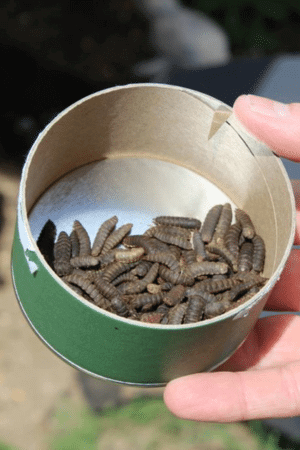
Calci Worms are tiny feeder insects. They’re also known as Black Soldier Fly larvae or Phoenix worms – and their scientific name is Hermetia Illucens. They’re small, soft-bodied creatures that are becoming increasingly popular as live insect feed for chickens. They are the larvae form of Black Soldier Flies, a common fly species found worldwide, indigenous to regions like North America, South America, and Asia.
These larvae have a unique nutritional profile that sets them apart from other common feed options for chickens. They are rich in essential vitamins, minerals, and proteins, making them an excellent supplement to your flock’s diet.
In addition to their nutritional benefits, Calci Worms are also an environmentally conscious choice for chicken owners. Unlike traditional sources of animal protein, Calci Worms are sustainably and ethically raised. They are usually produced using organic waste materials, such as food scraps, and do not contribute to deforestation or greenhouse gas emissions. When we farm our BSF larvae, we recycle brewery waste that would otherwise decompose and create greenhouse gases – making our BSF farming actually carbon negative!
By choosing to feed Calci Worms to your chickens, you are making a positive impact on the environment while providing your chickens with a nutritious and wholesome treat.
What do Calci Worms Turn Into?
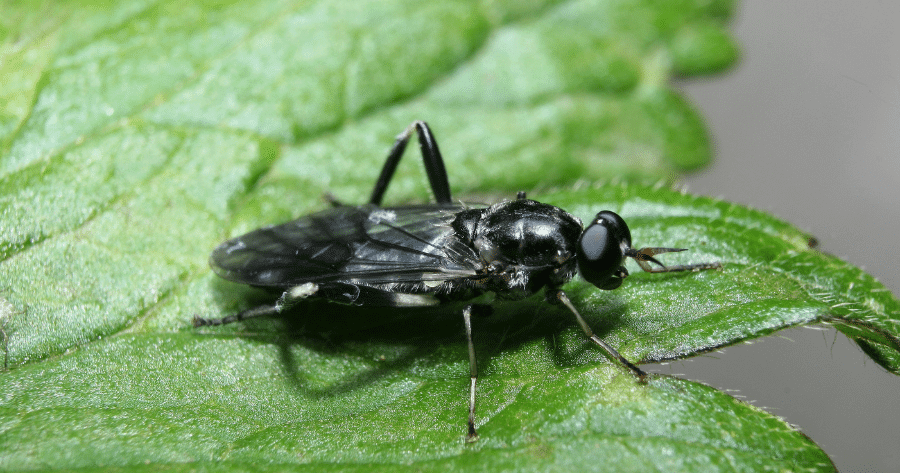
Ultimately, they turn into Black Soldier Flies.
The life cycle of Calci Worms:
Like all insects, Calci Worms undergo a complete metamorphosis, which means they experience several stages in their life cycle: egg, larva, pupa, and adult. So, what do these worms turn into? Here’s the answer, and an explanation of how it happens.
Larvae: This is the stage in which Calci Worms are cream-coloured and most suppliers of Calci Worms supply them at this stage. Not ECOnourish, though! Find out more below…
Pupae: As they grow, they enter the pupation stage, during which they store a lot of fat and calcium – making them an even more excellent source of nutrition. This is the stage of the life cycle that we supply our Calci Worms at – they’re big, juicy and have packed themselves full of nutrients from all the waste they’ve devoured!
Adults: Calci Worms ultimately turn into adult Black Soldier Flies, a non-pest species of fly that poses minimal risks to humans and helps decrease the population of other pest insects.
Under favourable environmental conditions and with adequate nourishment, Calci Worms can reach full maturity in 4 weeks.
With this new insight about Calci Worms, their life cycle becomes more than just a curiosity. It reminds us of the incredible interconnectedness of nature and how even the smallest creatures play a significant role in our ecosystem. And Black Soldier Flies are one of the most significant, special insects our planet is blessed with.
What’s so special about Black Soldier Flies?
Black Soldier Flies, the adult form of Calci Worms, are super special creatures that scientists and agricultural experts get very excited about. These flies are considered beneficial insects for many reasons.
They do not carry diseases, for one. Adult live Black Soldier Flies don’t even have mouths. They live a short time, and their sole purpose is to breed. The flies are not attracted to human habitation, and they prevent houseflies and other insects from breeding in the same habitat, leading to a decrease in pest populations.
As larvae, they have a voracious appetite and can consume large amounts of waste, such as food scraps and manure, which helps to reduce waste in landfills and decrease the release of greenhouse gases. This is a process known as bioconversion.
They convert the organic waste they consume into highly nutritious larvae for other animals to eat. For this reason, scientists and agricultural experts have recognised the potential of black soldier flies as a sustainable source of protein for animal feed. And even, one day, to feed humans!
Why should I feed Calci Worms to my chickens?
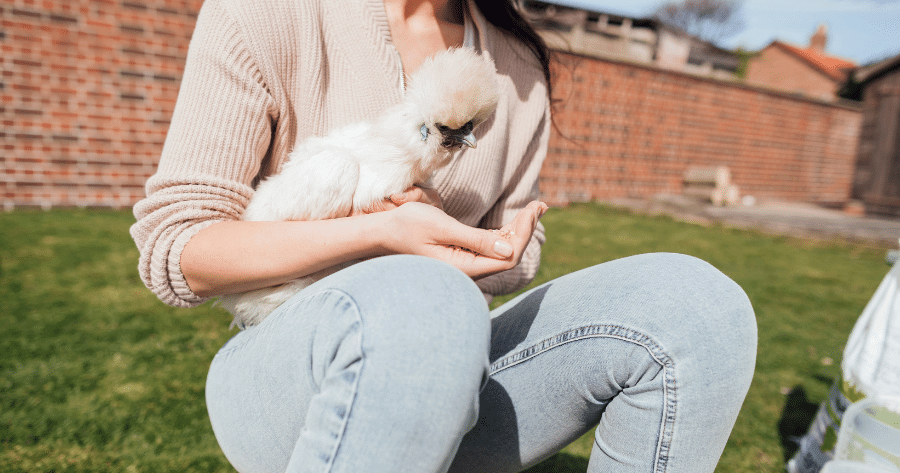
Calci Worms or Black Soldier Fly larvae offer a range of benefits that make them a fantastic choice for chicken feed. Here are a few reasons why they are considered a superfood for chickens:
1. High Nutritional Value: Calci Worms are packed with essential nutrients that can greatly improve your chickens’ health. They are an excellent source of protein, containing up to 40% protein content. Protein is crucial for muscle development, feather growth, and overall body function in chickens. Additionally, Calci Worms live up to their name. They’re mega-rich in calcium, phosphorus, and other minerals that are essential for strong bones, egg production, and overall immunity.
2. Enrichment: In addition to their nutritional benefits, Calci Worms also provide enrichment for your chickens. Chickens are naturally curious and enjoy pecking and foraging for their food. By introducing Calci Worms into their diet, you are offering them a new and exciting food source that can keep them entertained and engaged. They LOVE the wriggly nature of the larvae and hunting them down – and this stimulates their natural foraging and hunting instincts. This can help prevent boredom and reduce the risk of destructive behaviours such as feather pecking, egg eating and aggression. Watching your chickens actively hunt and eat Calci Worms can also be a source of entertainment for you as a chicken owner!
3. Gut Health Benefits: Calci Worms contain beneficial bacteria known as probiotics. Probiotics are essential for maintaining a healthy gut in chickens. A healthy gut not only aids in digestion but also helps boost the immune system, improve nutrient absorption, and prevent digestive disorders. Calci Worms are also rich in chitin, a type of fibre that can promote gut health in chickens. Chitin acts as a prebiotic, which means it provides nourishment for beneficial gut bacteria, helping to improve digestion and strengthen the immune system. By including Calci Worms in your chickens’ diet, you can promote a thriving population of beneficial gut bacteria, leading to better overall health.
4. Environmentally Friendly: Choosing Calci Worms as a live insect feed for your chickens is not only beneficial for your flock but also for the environment. Calci Worms are a sustainable choice as they are produced using organic waste materials, reducing the need for traditional feed sources. Additionally, as we’ve already covered, the larvae stage of black soldier flies is highly efficient at converting waste into protein, making them an eco-friendly alternative to other feed options. By feeding Calci Worms to your chickens, you are contributing to reducing food waste and promoting a more sustainable food system.
5. Palatable and Digestible: One of the reasons why Calci Worms are a popular choice for chickens is because they are highly palatable and easily digestible. Chickens are naturally attracted to the smell and taste of Calci Worms. Also, the soft exoskeleton of Calci Worms makes them easy for chickens to digest, ensuring that they can fully absorb and utilise the nutrients they provide.
6. Natural Pesticide Control: Another benefit of feeding Calci Worms to chickens is their potential to control pests in your flock. That naturally occurring substance, chitin, is also effective in controlling external parasites, such as mites and lice, in chickens. By incorporating Calci Worms into your chickens’ diet, you can help keep your flock healthy and free from pesky pests.
7. Convenient and Easy to Store: When it comes to feeding your chickens live insects, convenience is key. Calci Worms at the pupal stage are an ideal choice because they are easy to store and require minimal maintenance. Unlike other live insects, Calci Worms have a long shelf life (up to 15 days before they pupate!) and can be stored at room temperature. This means you can stock up on them and have a ready-to-feed option whenever you need it. Additionally, Calci Worms do not require any special care or feeding, making them a hassle-free option for busy chicken owners.
What are the nutritional benefits of Calci Worms?
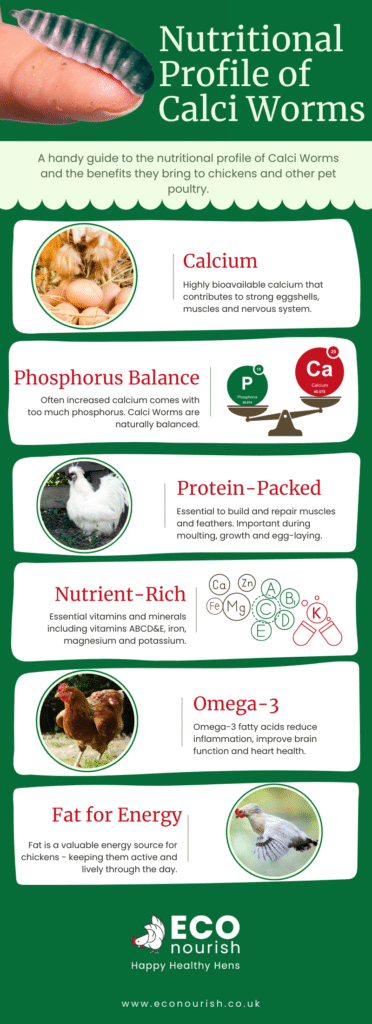
1. High Calcium Content: True to the nickname, Calci Worms are rich in calcium. Calcium is essential for chickens as it helps in the development and maintenance of strong bones, eggshells, and overall skeletal health. It’s also essential for nerve health and muscle strength – and without adequate calcium, laying hens can have laying troubles caused by soft or weak eggshells. They can also lack coordination of nerves and muscles to push eggs through their vents. This can lead to hens becoming egg-bound and horrific health problems like egg yolk peritonitis.
By incorporating Calci Worms into their diet, you can ensure that your chickens receive an ample supply of calcium, reducing the risk of these problems. The calcium in Calci Worms is also highly bioavailable. This means their bodies can easily absorb the calcium content of the larvae, which isn’t true of all foods and commercially available calcium supplements.
2. Balanced Calcium to Phosphorus Ratio: One of the unique features of Calci Worms is their positive calcium-to-phosphorus ratio. Many feeder insects have more phosphorus than calcium, which can lead to unsafe imbalances. There are no such worries with Calci Worms, though.
3. Protein-Packed: They are an excellent source of high-quality animal protein, which is essential for chickens to build and repair their muscles, feathers, and other body tissues. Protein is particularly important during times of growth, moulting, and egg production. By providing your flock with Calci Worms, you are ensuring that they receive a high-quality protein source that can support their overall health and vitality.
4. Nutrient-Rich: Aside from calcium and protein, Calci Worms are also loaded with essential vitamins and minerals. These include vitamins A, B, C, D, and E, as well as iron, magnesium, beforementioned phosphorus, and potassium. These nutrients support various bodily functions, such as immune system function, cell growth and repair, and energy production. By feeding your chickens Calci Worms, you can ensure they have everything they need to thrive.
5. Omega-3 Fatty Acids: Omega-3 fatty acids are known for their numerous health benefits, including reducing inflammation, improving brain function, and promoting heart health. Calci Worms contain omega-3 fatty acids, making them an excellent natural source of this essential nutrient for your chickens.
6. Energy giving fat: Calci Worms are not only packed with protein, but they also contain a good amount of fat. This fat serves as a valuable source of energy for your chickens, helping to keep them active and lively throughout the day. Whether your chickens are free-ranging or confined to a run, providing them with Calci Worms can give them the boost they need to stay energized and engaged, avoiding depression.
Calci Worms vs Mealworms
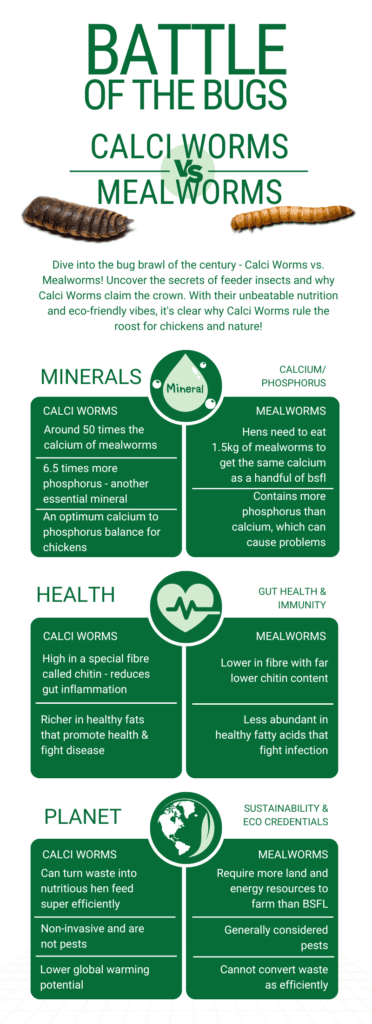
What’s the Difference?
While both Calci Worms and mealworms are popular choices for chicken owners, there are some key differences between the two. Understanding these differences can help you make an informed decision about which option is best for your flock.
First, Calci Worms and mealworms have different nutrient profiles. Calci Worms are higher in calcium and protein compared to mealworms. This makes them an excellent choice for chickens that need a boost in these nutrients, such as laying hens. Mealworms, on the other hand, are lower in calcium but higher in fat content. They can lead to obesity in chickens if overfed.
Second, Calci Worms and mealworms have different textures. Calci Worms have a soft, fleshy texture, while mealworms have a crunchy exoskeleton. Some chickens may have a preference for one texture over the other. The soft exoskeleton of Calci Worms makes them easier to digest, though.
Finally, Calci Worms and mealworms have different environmental profiles. Breeding mealworms for animal feed is a massive improvement on traditional protein for animal feed like fishmeal and soy protein. But the bioconversion process with BSF larvae shows a lower Global Warming Potential (GWP) than mealworms.
Are Calci Worms safe for chickens to eat?
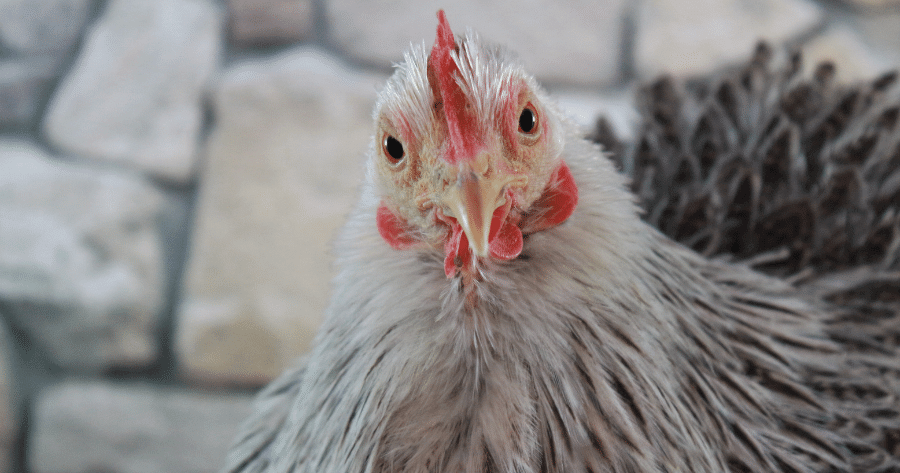
Yes, Calci Worms are completely safe for chickens to eat. In fact, they are not only safe but also highly beneficial for their overall health and wellbeing.
These tiny creatures are a rich source of protein, calcium, and other essential nutrients crucial for chickens’ growth and development. They contain almost 50% protein and are packed with vitamins, minerals, and amino acids that promote healthy feather growth, strong bones, and improved immune function in chickens.
One of the main reasons why Calci Worms are considered a superfood is their calcium content. Calcium is vital for egg production and the formation of strong eggshells. Chickens that have access to Calci Worms in their diet are more likely to lay eggs with thicker, stronger shells, reducing the risk of egg breakage and ensuring healthier chicks.
Furthermore, the high protein content in Calci Worms helps chickens build and maintain muscle mass, which is important for their overall strength and vitality. Protein is also essential for feather growth, ensuring that chickens have healthy and glossy plumage. Additionally, the amino acids found in Calci Worms support tissue regeneration, aiding in wound healing or injuries.
In addition to being nutritious and environmentally friendly, Calci Worms are also easy to feed to chickens. They can be fed live, adding fun and foraging to food. Chickens love the taste of Calci Worms, making it an enjoyable treat for them.
When feeding Calci Worms to your chickens, it’s important to do so in moderation. While they are highly nutritious, they should be given as a supplement to their regular diet and not as a replacement for balanced chicken feed. A good rule of thumb is to feed Calci Worms as a supplement or treat, offering them a small amount daily.
When purchasing Calci Worms for your chickens, buying them from a reputable source is important. Look for suppliers that raise their Calci Worms in clean and ethical conditions, ensuring their safety and quality.
Are Calci Worms safe for the planet?
Yes, Calci Worms are safe for the planet. In fact, they are considered a more environmentally friendly choice for feeding chickens compared to other protein sources. Calci Worms can be produced from food waste, such as fruits and vegetables, reducing the amount of organic waste going to landfills. This means that they contribute to reducing food waste and help in the effort to combat climate change.
Additionally, Calci Worms are highly efficient at converting food into biomass. This means that they require less feed to produce the same amount of protein compared to other protein sources like soy or fish meal. This efficiency makes them a more sustainable option for chicken owners who want to reduce their carbon footprint.
By choosing to feed Calci Worms to your chickens, you are making a positive impact on the environment. You are reducing food waste, conserving resources, and supporting a more sustainable and eco-friendly way of raising chickens.
Doesn’t DEFRA say we can’t feed insects to our chickens?
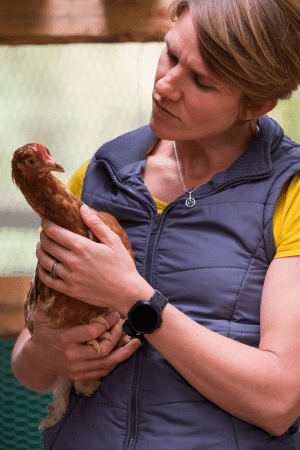
There seems to be some confusion regarding the feeding of insects to chickens in the UK. The truth is, in 2017, the Department for Environment, Food and Rural Affairs (DEFRA) did introduce regulations regarding the use of dried and processed insects as feed for poultry.
However, this does not apply to feeding LIVE insects to chickens. This is 100% DEFRA-approved. BSF larvae are commercially bred in controlled environments, ensuring their safety and quality. As a result, Calci Worms are exempt from these regulations and are considered safe for feeding to chickens in the UK.
When purchasing Calci Worms for your chickens, it’s still crucial to buy them from a reputable, UK source that follows the necessary guidelines and regulations. Look for suppliers who adhere to strict breeding standards and ensure the safety of their products – and those who are Trading Standards approved, like us.
Find out more about DEFRA’s stance on feeding live insects to chickens
How to feed Calci Worms to Chickens
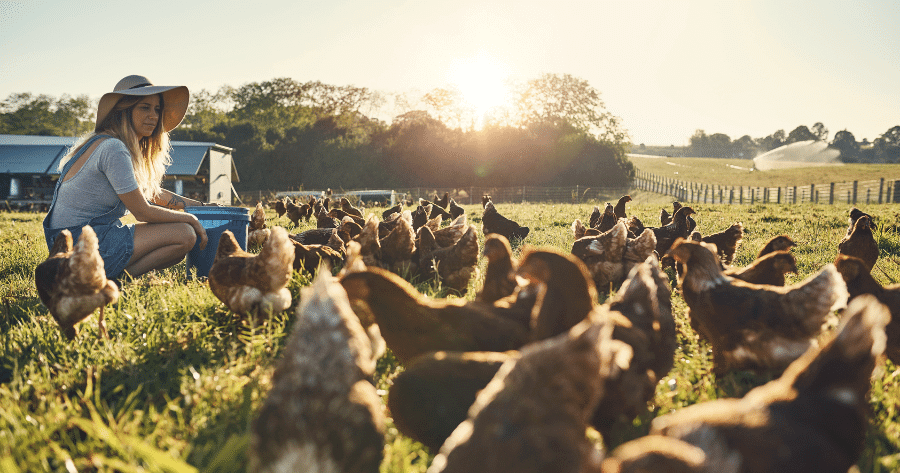
Feeding Calci Worms to your chickens is simple and straightforward. Here are some tips to help you get started:
1. Introduce Calci Worms gradually: If your chickens have never had Calci Worms before, it’s a good idea to introduce them slowly. Start by offering a small amount and observe how your flock reacts. They will most likely be very excited!
2. Use Calci Worms as a treat or supplement: Calci Worms should not be the sole source of nutrition for your chickens. They should be fed as a treat or supplement to their regular diet. This ensures that your chickens are getting a balanced and varied diet.
3. Use Calci Worms as a Training Aid: Chickens love Calci Worms so much, they would do pretty much anything for them… Like returning to their run or coop from free-ranging without you having to chase them around the garden.
4. Store Calci Worms properly: Calci Worms should be stored in a cool, dry place. Avoid exposing them to direct sunlight or extreme temperatures, as this can degrade their quality or kill them. Excessive heat can also make them pupate faster.
How many Calci Worms should I feed my Chickens?
When it comes to feeding Calci Worms to your chickens, the exact amount will depend on the size and age of your flock. As a general guideline, you can offer 10g of Calci Worms per chicken per day. However, it’s important to remember that Calci Worms should be fed as a treat or supplement, not as the sole source of nutrition. Your chickens should still have access to their regular feed and a balanced diet.
Smaller breeds of chicken – like the smallest Bantam breeds – only need around 6g per day. Average chickens, ducks and similar-sized birds need the standard 10g per day. Larger chicken breeds may need around 12-15g per day. Very large chicken breeds and larger fowl like geese and turkeys may need more than 20g per day.
As a rule, Calci Worms shouldn’t make up more than 10% of your chickens’ total diet. Too much protein can be harmful to your chickens’ health, so it’s best to offer Calci Worms in moderation.
As with any new food, it’s a good idea to start small and observe how your chickens respond. If they enjoy the Calci Worms and tolerate them well, you can gradually increase the amount over time. Remember to monitor your chickens’ overall health and adjust their diet accordingly.
By offering Calci Worms as a treat or supplement, you’re providing your chickens with a superfood nutrition boost. They will not only enjoy the tasty treat but also benefit from the high levels of protein and calcium. So go ahead and give your flock a healthy and delicious treat!
How often Should I feed Calci Worms to my Chickens?
Ideally, you can offer Calci Worms to your chickens every day, or at least a few times a week. These nutritious treats can be a great addition to their regular feed and can help boost their overall health and wellbeing.
It’s worth mentioning that Calci Worms are high in protein, calcium, and other essential vitamins and minerals. This makes them particularly beneficial for growing young chickens, hens during their egg-laying phase, or chickens recovering from illness or injury or after rehoming. For chickens in good health, Calci Worms can still be offered as a healthy snack that provides an extra boost of nutrition and enrichment.
How should I introduce Calci Worms to Chickens?

If you’re looking for a nutritious and tasty treat to enhance your chickens’ diet, look no further than Calci Worms. But how do you go about introducing Calci Worms to your chickens? Don’t worry, we’ve got you covered.
1. Mix and Match: Try mixing the Calci Worms with their favourite treats or feed. You can sprinkle the worms on top of their grains or scatter them across your garden when they’re free-ranging.
2. Hand Feed: A little bit of the chickens’ love for Calci Worms could be transferred to you if you get them to associate contact with the treat! They’ll be chasing you around the garden in no time.
3. Get Creative: Chickens are curious and intelligent. So why not make feeding time a bit more exciting? Hang a small basket or container from the inside of the coop or run, and fill it with a mix of Calci Worms and other treats. The larvae will fall out, and this will encourage your chickens to peck and forage for their food, providing both mental stimulation and a delicious meal. You can create Calci Worm treasure hunts or obstacle courses across the garden or run for your chickens – giving them lots of mental and physical exercise.
Are Calci Worms a complete source of nutrition for chickens?
Calci Worms are a fantastic addition to a chicken’s diet and can provide a great source of nutrition. However, it is important to note that they should not be the sole source of nutrition for your chickens. While Calci Worms are high in protein, calcium, and other essential nutrients, chickens still require a well-rounded diet to thrive.
Incorporating Calci Worms into your chicken’s diet can be a smart way to provide them with a superfood nutrition boost. But it’s crucial to remember that they should be part of a varied diet for your chickens. A balanced diet for chickens typically includes a mix of grains, seeds, fruits, vegetables, AND insects. You can expect your flock’s other feed consumption to reduce by 10-20% when feeding Calci Worms – and this is normal. They’re packed with protein and fat, which is super filling.
What is the best way to store Calci Worms?
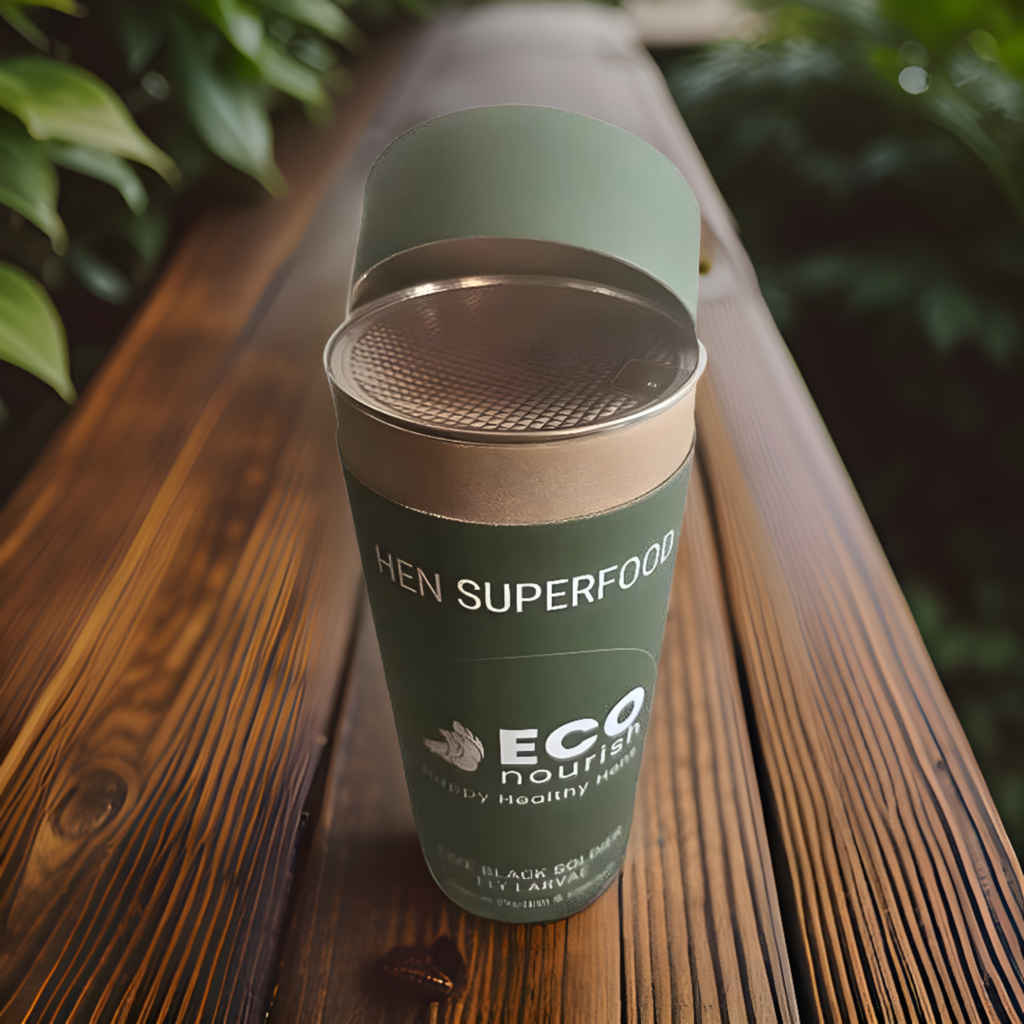
When it comes to storing Calci Worms for your chickens, it’s important to take a few extra steps to ensure their freshness and longevity. It’s crucial to handle them properly to maximise their benefits. Here are some tips on the best way to store Calci Worms for your chickens:
1. Keep them cool: Calci Worms prefer cooler temperatures. They don’t do well in direct sunlight. So keep them in a cool, dark place. This will help to slow down their metabolism and keep them alive – and stop them from pupating early.
2. Use a suitable container: To store Calci Worms, opt for a well-ventilated container that allows for air circulation. When you order BSF larvae from ECOnourish, they will come in a container that acts as storage and a feeding method in one. Keep them in there until they’re used up!
Can chickens eat too many Calci Worms?
Chickens are known to be voracious eaters, and it’s not uncommon for them to gobble up anything in sight. When it comes to Calci Worms, however, moderation is key. While they are a nutritious superfood for chickens, feeding them too many Calci Worms can have some negative effects on your feathered friends.
Balance is crucial. Feeding chickens too many Calci Worms can upset their delicate dietary balance and lead to a range of problems.
Overfeeding chickens anything can lead to weight gain and obesity. Calci Worms are high in fat, so it’s important to consider their calorie content when feeding them to your chickens. Again, moderation is key. Stick to the quantities we’ve outlined above.
Why are Calci Worms are a Superfood for Chickens?
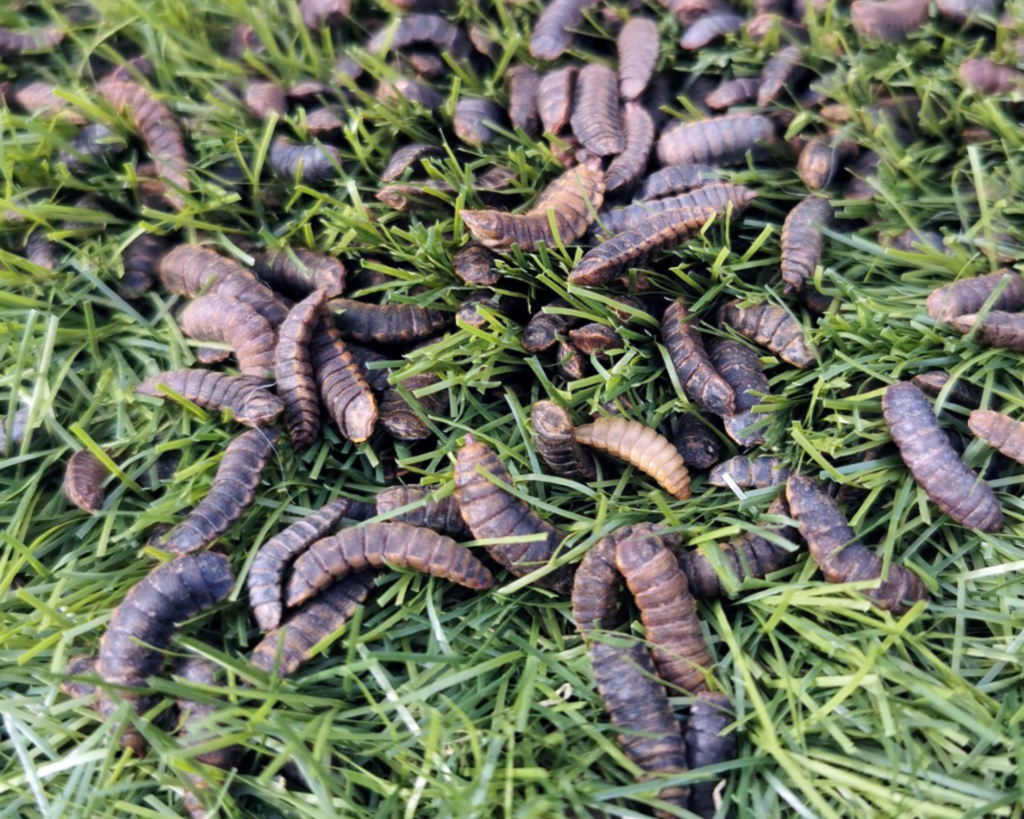
What is the definition of a “superfood”?
Well, a superfood is typically considered as a nutrient-rich food that’s highly beneficial for overall health and well-being. This usually means there is generally accepted scientific evidence that the nutritional properties of a food offer compelling health benefits beyond the usual nutrient provision. So, how exactly do Calci Worms stack up in the superfood league? Glad you asked!
Crammed with Protein
First off, let’s talk protein, the building block of life. What actually makes the protein in Calci Worms so valuable is it’s amino acid profile. Amino acids are the “bricks” that protein is made from, and different amino acids play specific roles in the body building and supporting different functions and structures.
Plant proteins like soy merely scratch the surface when it comes to the amino acid content. Not only is there less of it overall, but also what they do contain is much less digestible. Therefore, what goes in, doesn’t necessarily get used.
The amino acid profile of animal-based proteins is just what the doctor ordered for our feathered friends. But wait, we hear you asking, “aren’t most animal proteins forbidden?” Why yes, they are! But there’s an exception. Live insects! Thank you, Black Soldier Fly!
Calcium Galore
Next up, have a think back to your early biology lessons. What’s essential for healthy bones and eggshells in birds? You guessed it right, calcium! Calci Worms bring plenty of that to the table, too. Take a pause, we feel you might have now realised why we keep calling them the ‘hen superfood.’
An Immune System’s Best Mate
Want your chickens to be healthy and happy? Of course, you do! Guess what? Black Soldier Fly larvae will also give their immune system a well-deserved boost!
What do I do if my chickens won’t try their Black Soldier Fly larvae?
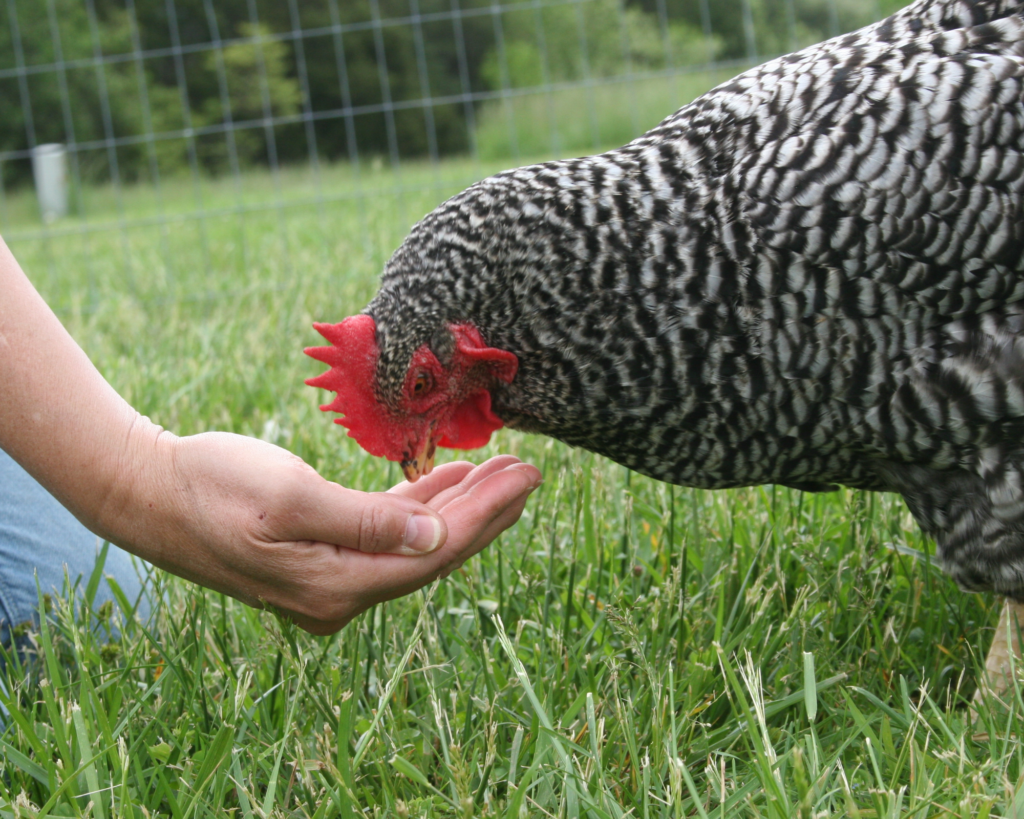
Most chickens fall instantly in love with these little wrigglers. But some are more hesitant. And what we’ve noticed is that it seems to be down to the pecking order!
If a top hen or cockerel is a bit cautious and reluctant to try the larvae, the rest of the flock take heed. This can lead to none of them being willing to be the larvae guinea pig.
Understanding this social conundrum is the key to getting your flock on board – and what tends to happen is that once one flock member has a go and starts signalling to the others that there’s something great over here, they all go wild!
We have a whole dedicated to tempting reluctant hens to try their larvae. You can read it here.
Where can I buy live Calci Worms for my chickens in the UK?
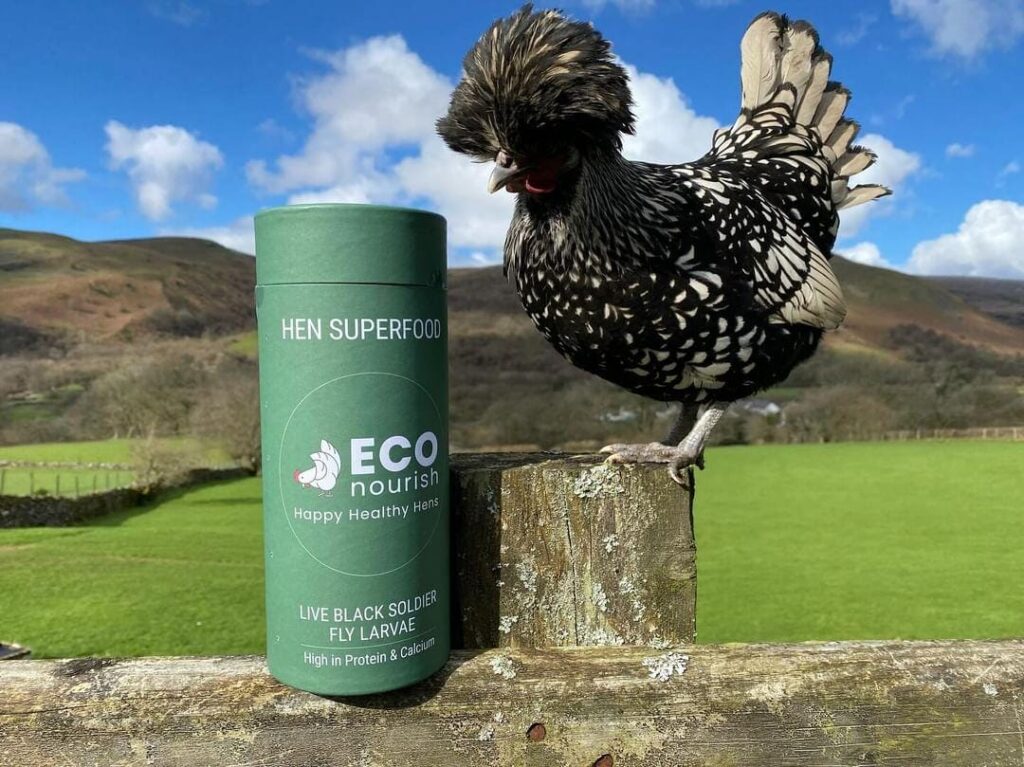
Before we came along, most people bought their Calci Worms from pet shops or reptile retailers. This is because Black Soldier Fly larvae have largely been undiscovered by the poultry community, though they’ve long been adored by reptile keepers. Sourcing your larvae in this way is fine for reptiles, who eat very little. But when you’re talking about poultry rather than paltry portions, it can get pretty expensive.
If you’re seeking a go-to source for Black Soldier Fly larvae, look no further than ECOnourish. As the first company catering specifically to poultry, ECOnourish leaves other competitors behind when it comes to cost-effectiveness. We suggest serving approximately 10g of larvae per chicken daily. If you purchased the larvae from this reptile supplier, it would set you back about £69.72 to feed ten hens for a week. However, with our unique live food subscription, the same amount would only cost you £20.69 from ECOnourish. So why not give us a try?
Reflecting on our calci worm education journey
And so, dear chicken-keeping friends, we’ve reached the end of our journey exploring the marvellous world of Calci Worms. There’s no doubt these wiggly wonders truly deserve their superfood status – and here’s a little recap of why:
- Bursting with essential nutrients like calcium, protein, and healthy fats.
- Brilliant for improving your chickens’ overall health and well-being and happiness.
- Fabulous for anyone who cares about sustainability and eco-friendly living.
As we part ways, we’d like to express how grateful we are for your company on this journey. We at ECOnourish believe in spreading the joy of raising chickens in harmony with our planet, hand-in-hand like the best of mates. We’re always here to offer you guidance, support, and a friendly conversation about the wonderful world of sustainable chicken care.
Be part of our feathered community
Get news, updates, fowl care guides and special offers delivered to your inbox
Ready to join the flock?
You’re just a click away from tackling your hens’ boredom, nutrition, stress and health with one easy solution. Get Back Soldier Fly larvae (Calci Worms) live insect hen feed delivered to your door.
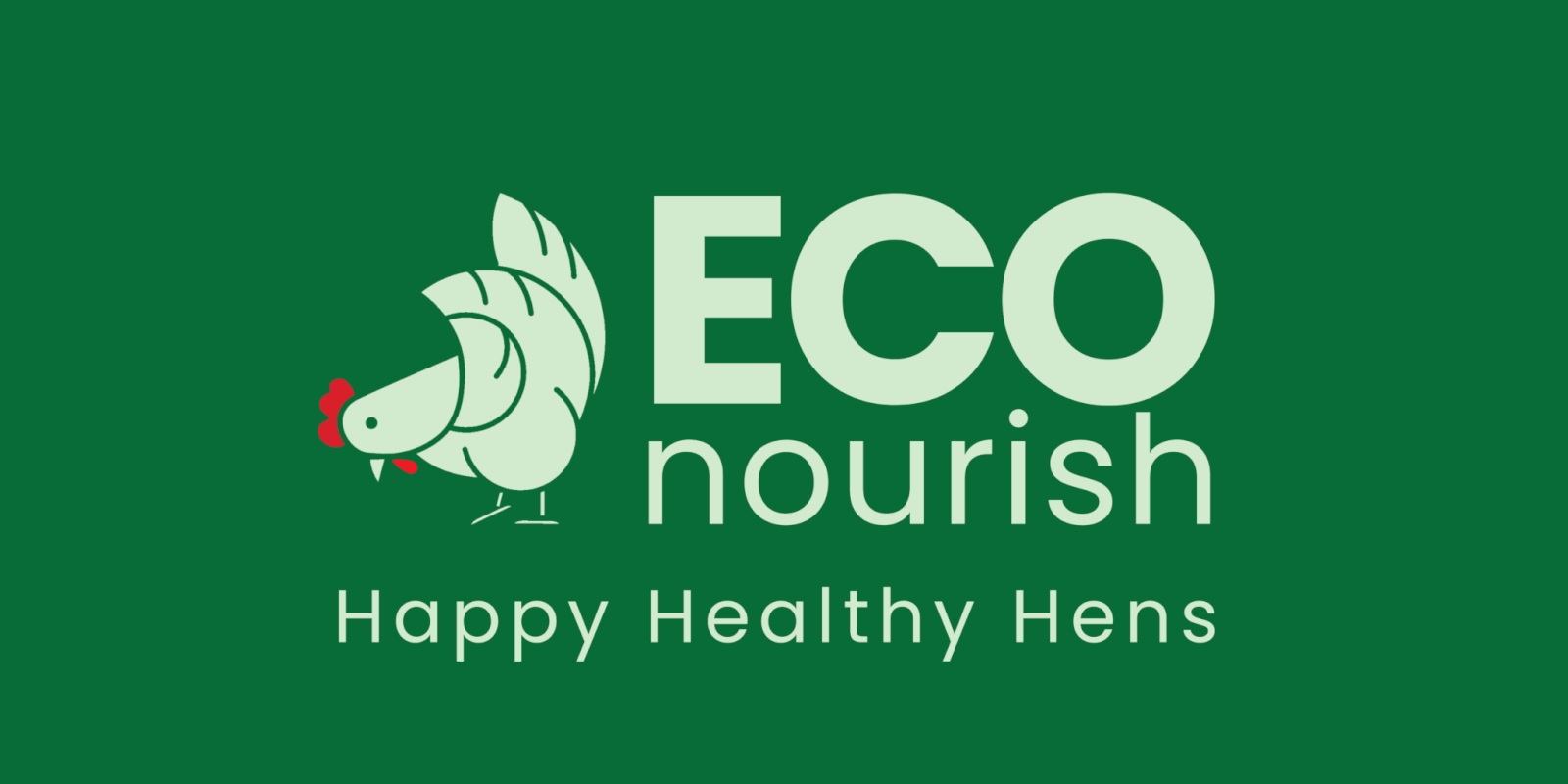

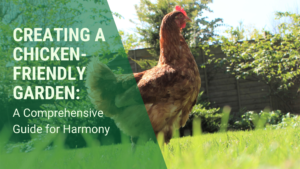
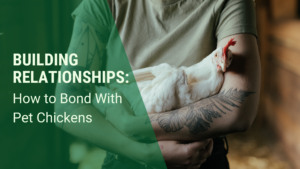

Hi, thanks for all the great information! I’m wondering how many black soldier fly larvae I should be feeding to my 1 year old peacock. I give him between 10 and 15 large live black soldier fly larvae per day. He loves them and gobbles them up. Actually prefers them over the dried ones. Is this too many or can I give more? Thank you so much!
Hello! You are so welcome. We don’t have any specific research data about feeding volumed for peacocks. Peacocks have high protein requirements because of their stunning plumage, as I’m sure you know. We recommend feeding chickens 10g of Calci Worms per day, which would be around 35-40 larvae at the pre-pupae stage (if your larvae are dark brown/black they’re pre-pupae, if they’re paler they’re younger and therefore smaller than this!). Peacocks are naturally going to benefit from more than that as larger birds with higher protein requirements, so we would say at least 10g per day. Hope this helps!